Between the Mine and the Stream
Herbert Hoover’s presidential philosophy
Justin E. H. Smith
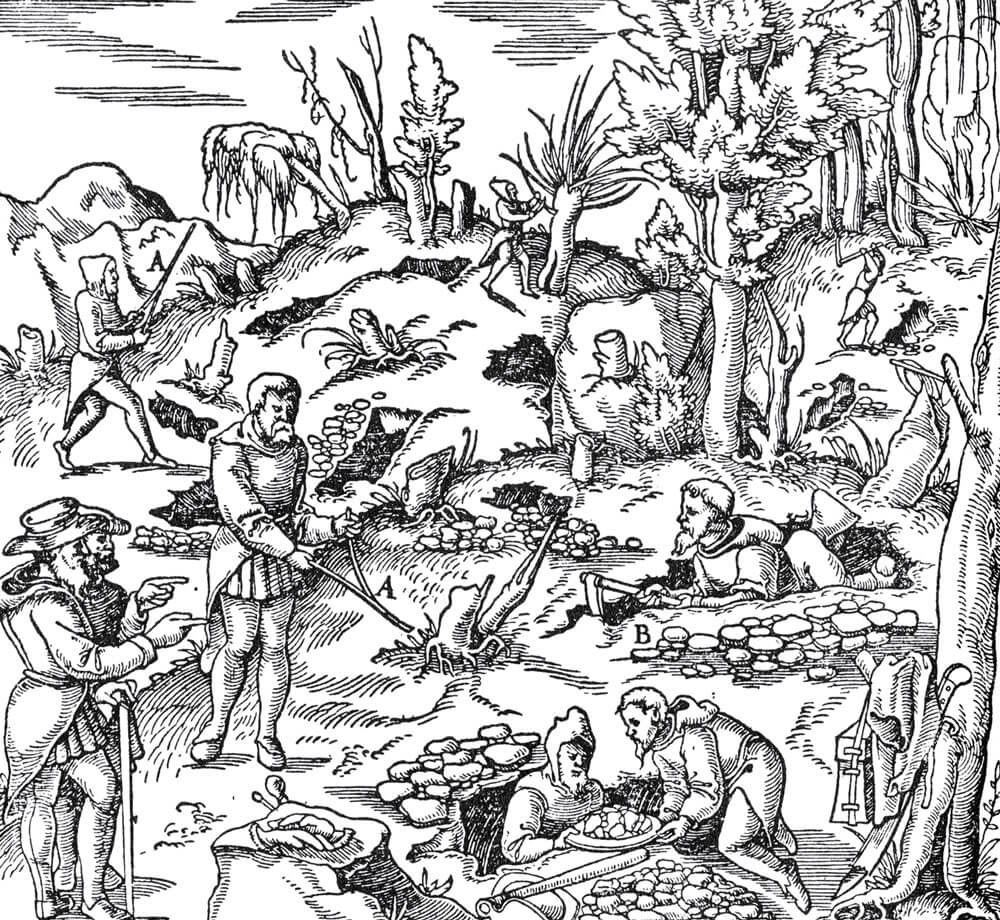
Gwalia, Western Australia, 1897. A young man, an American man, rides with his entourage into town, on camelback. He is covered with blackflies. He has the air of an arrogant yet honorable man. The ragged miners assembled there know that the man has recently earned a degree in geology from a university on the other side of the ocean. He has come to apply the most advanced knowledge of modern mine engineering to extract, with their labor, the metal riches from this continent of red dust.
The man succeeds. He cuts costs by employing desperate Italian immigrants, ready to work for lower wages, for any wages. They are scabs, as the English and Irish union militants see it, but they get the job done.
The man’s employers, the London-based Bewick, Moreing & Co., are impressed, and send him to China to continue his work. He is now accompanied by his former Stanford sweetheart and new wife, Lou, née Henry. They will live through the Boxer Rebellion together, in Tianjin in 1900. Both, it is reported, show courage under siege and agility with firearms.
The man is made a partner in his company, and the couple will enjoy long sojourns in London, he directing mining operations around the world from an abstract distance, she continuing in her study of languages and literatures, notably Latin and Chinese. In 1905, she comes across a copy of Georgius Agricola’s (or Georg Bauer’s) 1556 work, De re metallica, on the subject of metals, mining, and metallurgy. It has never been translated into English. The couple decides to undertake this project together.
The resulting edition is published in London in 1912. It is the very model of what historians of science today call “Whiggish” scholarship. It is solid and rigorous as far as facts go, and precise in matters of translation (going so far as to include a thorough study of the sixteenth-century German mining vocabulary that Agricola had rendered, for the first time, into learned Latin). Yet it is also triumphalist, presentist, and hermeneutically blind, setting out from the premise that we, today, in 1912, know better than they did in the past, and that history has been a long, slow march out of foolishness, from a world of dark superstition to one of no-bullshit problem-solving: Agricola is an impressive thinker “for his era.” The translators do not seem to be worried that their own thought too is of an era, of which it may one day be taken as typical. (Curiously, Whiggism in science can coexist with the staunchest classicism in philology. Thus, in the translators’ preface, we are told that Agricola’s Latin is mostly free of “medieval corruption,” yet regrettably “tainted with German construction.”[1])
Leaving aside our translators’ Whiggish bent, the British political party known as the Whigs do have a complicated historical relationship to the American party of our mining-engineer-turned-Latinist. In 1929, he will be elected, as a Republican, to the office of president of the United States.
When we speak of a “presidential philosophy,” we do not ordinarily have in mind the intellectual debt a president may have had to Renaissance natural philosophy. But Herbert Hoover’s intellectual development seems to require that we widen our ordinary scope. Hooverism may in fact be the last echo of a sort of statesmanly engagement with philosophy that probes somewhat deeper into the order of things, and into humanity’s place in that order, than does the recent genre of campaign-minded, policy-focused, ghostwritten memoirs.
Hoover’s philosophy is continuous with a long American tradition, born in England, of engaging with nature, both for the wonder of the thing itself and for the more practical empiricist aim, typified already in the seventeenth century by Francis Bacon, of discovering better ways to dominate it and to put it to use for us. The idea that philosophy might be practical in this way has been almost completely erased from our consciousness today, above all in the professionalized bubble of academic philosophy. Yet, from the sixteenth to the eighteenth centuries, the period from which Hoover drew the most, common usage of the term makes perfectly clear that what a “philosopher” does primarily is to inquire—as Socrates was, wrongly, accused of doing—into what goes on in the heavens above and the earth below (and everywhere between as well). In a characteristic usage of the term, John Evelyn, in his 1661 work Fumifugium; Or, The Inconveniencie of the Aer and Smoak of London Dissipated, speaks of “these unwholsome vapours, that distempered the Aer, to the very raising of Storms and tempests; upon which a Philosopher might amply discourse.”[2] Or, as Agricola himself explains, “there are many arts and sciences of which a miner should not be ignorant. First there is Philosophy, that he may discern the origin, cause, and nature of subterranean things.”[3]
Thomas Jefferson would amply discourse on the floral and faunal diversity of the New World, not least with his contemporary, the French natural historian Buffon, and also participate in ethnolinguistic surveys of the Native American groups of the Northeast. This sort of practical undertaking was one of the principal tasks of philosophy as commonly understood into the eighteenth century, and particularly so in the United States, where it was the only conception of philosophy that seemed appropriate for the nascent nation. Even those Americans who drew on supremely abstract continental systems, such as the one Hegel had lately produced, nonetheless understood that a philosophy that did not directly engage the hard resistant bodies of the physical world and their strange properties—metals and mines, electricity, hydraulics, and magnetism—had no place on a continent and on a frontier that had only just begun to be subjugated.[4]
Knowledge is power, Francis Bacon said, long before Michel Foucault would transform this evident truth to mean something different: that knowledge is nothing but the expression of power. The removal of supernatural beings and other products of ignorance from our imagination enabled the removal of precious metals from underground veins. Agricola cleared the mineshafts of gnomes and helped along the appropriation of all that lay hidden under the earth. Jefferson surveyed the natural diversity of a new continent, and the new knowledge of it fed the dream of the full conquest of it. Even the recording of Native languages was a prelude to the elimination of those who spoke them. And Hoover carried this project even further. Born in Iowa in 1874, while the so-called “Indian Wars” were raging, the first president from west of the Mississippi would continue westward still, to California, and from there he would cross the ocean, to new continents, to old new continents. The year after Hoover crossed the Pacific, the United States would annex Hawai’i as a territory and set up a military government in the Philippines. Knowledge is power, the young Stanford graduate must have thought to himself as he set out from California across the ocean. So powerful in fact that it cannot be stopped at the edge of a continent, but, manifestly, is destined to take over the world.
In De re metallica, Agricola felt compelled to neutralize a certain deep-seated and ancient anxiety about mining. It is one that Pliny the Elder expresses in his Natural History when he bemoans the absurd lengths to which men will go to rape the earth out of greed for gold. “We penetrate into her entrails ... as though each spot we tread upon were not sufficiently bounteous and fertile for us.”[5] But in the new, modern spirit, of which Agricola is an early harbinger, the earth does not have entrails, only resources. He no longer believes that minerals are born of a sort of seed in the earth’s matrix: a Latin term that was common in geology into the eighteenth century, and that translates as “womb.” As the Hoovers will later remark, it is interesting that Agricola preserves the term “vein” (vena), which, like matrix, is borrowed from the realm of biology.[6] But for him, this is the mere lexical fossil of an outdated concept, for the earth is no longer living, no longer to be comprehended in the same terms as the vital, pullulating creatures that move on its surface.
And so the ironically named Agricola defends mining against those who “glorify agriculture beyond measure.”[7] The earth we tread on may be bounteous, and it is good that the farmers know to extract its fruits. “But let them leave to miners the gloomy valleys and sterile mountains, that they may draw forth from these, gems and metals which can buy, not only the crops, but all things that are sold.”[8] Mining trumps farming because its “fruits” are exchangeable for any and all others. But the work of getting these fruits, as the ancients had warned, is dirty. Poisonous air hangs down there, as if to warn us away. A philosopher-miner might amply discourse on it, if he is not yet dead of asphyxiation.
Among Agricola’s preferred methods of mineral extraction is fire setting, a technique that induces thermal shock in subterranean shafts and causes the ore to break away more easily. This method would become antiquated with the use of explosives and, later, of chemical processes such as cyanidation. A century or so after Agricola, the German philosopher Leibniz would propose using water pressure to extract silver from the Harz mountains.
By the time of Hoover’s presidency, Pliny’s admonitions against digging into the earth out of greed for gold would be entirely forgotten. In the nineteenth century, gold had itself become a significant motor in the westward motion of America, and by the late 1920s, the earth would be spotted with open mining pits—though these were still sparse and no one had yet thought of simply removing the tops of mountains in search of valuable metals, as they began to do in Appalachia in the 1970s. Union Carbide’s Hawk’s Nest Tunnel project in West Virginia, begun in 1927, resulted a few years later, during Hoover’s presidency, in the death by silicosis of 476 miners tasked with pulling silica out of the earth for use in electroprocessing steel.
The subterranean world had been depopulated of its gnomes and ogres and mysterious powers; the spirit of rational Agricola had won out over the hallucinations of the seventeenth-century Jesuit Athanasius Kircher, who in his Mundus subterraneus of 1665 would give a rather detailed account of the malevolent beings one will encounter if one descends into the crater of a volcano.[9] The triumphalism of Herbert Hoover, had he thought about it, might have been tempered by the awareness that something down there, underneath the earth, deep in its veins, still wants to kill those who are compelled to go down there. Or, rather, it kills us without even wanting to, which is perhaps more terrifying still. And it is Pliny’s forgotten warning that the ultimate cause of all this death is greed—that if the earth is killing us, this is only because we are probing into it without warrant or invitation—that points the way to a tertium quid that is neither ignorant superstition nor the triumphalism of the engineer, neither fear of nature nor domination of it, but rather the search after some sort of harmony with it.
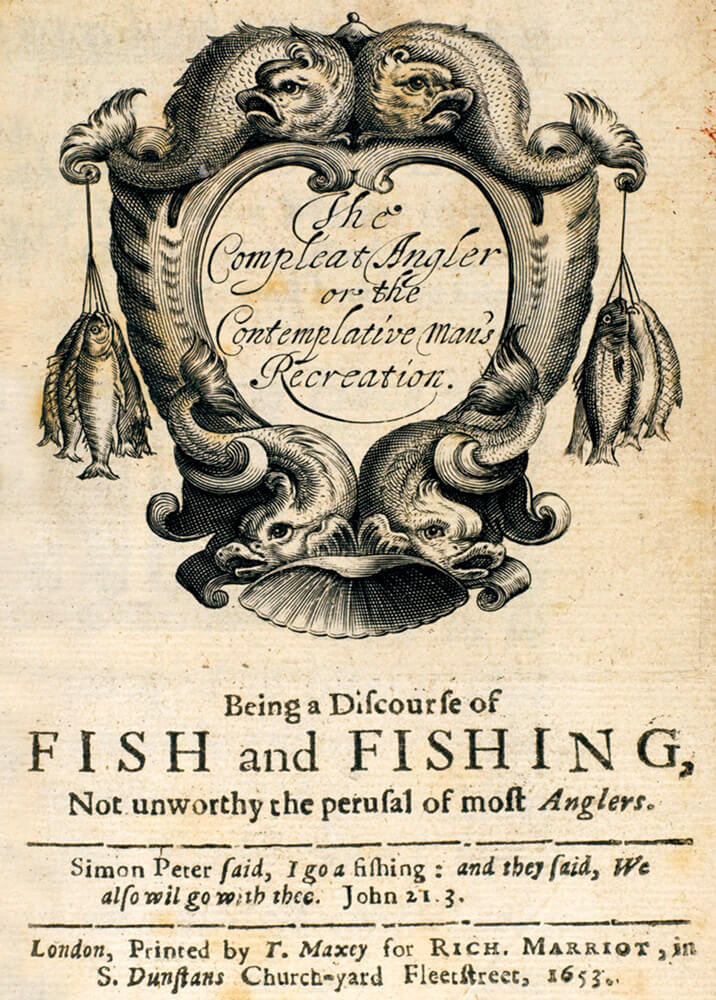
This brings us to the second phase of Hoover’s philosophical Bildung. If Agricola had been the guiding thinker of our president’s early engagement with philosophy (conceived broadly, again, to include what was once called natural philosophy and is now called science), the inspiration for his later thought would be Izaak Walton, the author of the 1653 book The Compleat Angler. This is a work of natural history and practical philosophy at once, both describing and taxonomizing various species of fishes, but also, much more importantly, reflecting on the importance of devotion to a particular practice in one’s life, such as fishing, as conducive to the attainment of true happiness.
In one conception, as we have already seen, philosophy is the activity of which Socrates was falsely accused: looking into what goes on in the heavens above and the earth below. In a parallel conception, one which way may indeed justly be attributed to the same Greek philosopher, it is nothing other than the cultivation, through practice, of virtue. For many schools of post-Socratic Greek philosophy, moreover, notably the Stoics, virtue and happiness are one and the same, or, perhaps better, they are coextensive: one cannot truly attain the one without attaining the other. It is such an understanding of philosophy that has caused some scholars, notably Pierre Hadot, to describe ancient philosophy as a “way of life.” Nor had this conception of philosophy gone extinct by the early modern period. In fact, philosophy as a way of life continued to coexist into the seventeenth century with the alternative model—philosophy as looking into things—sometimes in tension with it, sometimes in harmony.
Walton himself plainly understands philosophy in both senses. Thus he speaks of the “commendations which some philosophical brains have bestowed upon the freshwater Perch,” as, for example, that they “have in their brain a stone, which is, in foreign parts, sold by apothecaries, being there noted to be very medicinable against the stone in the reins.”[10] But he also concludes his treatise with an admission from the Hunter (one of three characters in the work, alongside the Fisherman and the Falconer) that “I will not forget the doctrine which you told me Socrates taught his scholars, that they should not think to be honoured so much for being philosophers, as to honour philosophy by their virtuous lives.”[11] The Hunter, who the fisherman has urged to try his pastime, then promises: “You advised me to the like concerning Angling, and I will endeavour to do so.”[12] He will endeavor, that is, to manifest virtue in his life by excelling at fishing, an activity that Walton conceives as salutary not in view of its outcomes, but rather in view of the contemplative nature of the process itself. “Virtue,” here, is meant in the double sense of the Greek arete, which is to say, both goodness, with the moral valences that word carries today, and excellence, in the sense of perfecting a particular skill. Here, angling will do just as well as practicing dialectic or yoga in pursuit of the virtuous life. It is, to draw on Aristotle’s distinction between the sorts of activities belonging variously to perfective and imperfective verbs, more like taking a walk than building a house: at any moment in the taking of a walk, it is the case that the walker has taken a walk, while it is only after completing the building of a house (“perfecting” the house) that a builder has built a house. One need not catch a fish in order to have fished, just as one need not come away from dialectical philosophy with some positive answer to a question. Whether angling really differs from hunting is a matter of debate—whether, that is, one can be said to have hunted even if one comes home empty-handed. But Walton’s own view is clear: angling is an “imperfective” activity, and as such it belongs among those other activities that are good not for how they finish, but for how they are before they’ve finished.
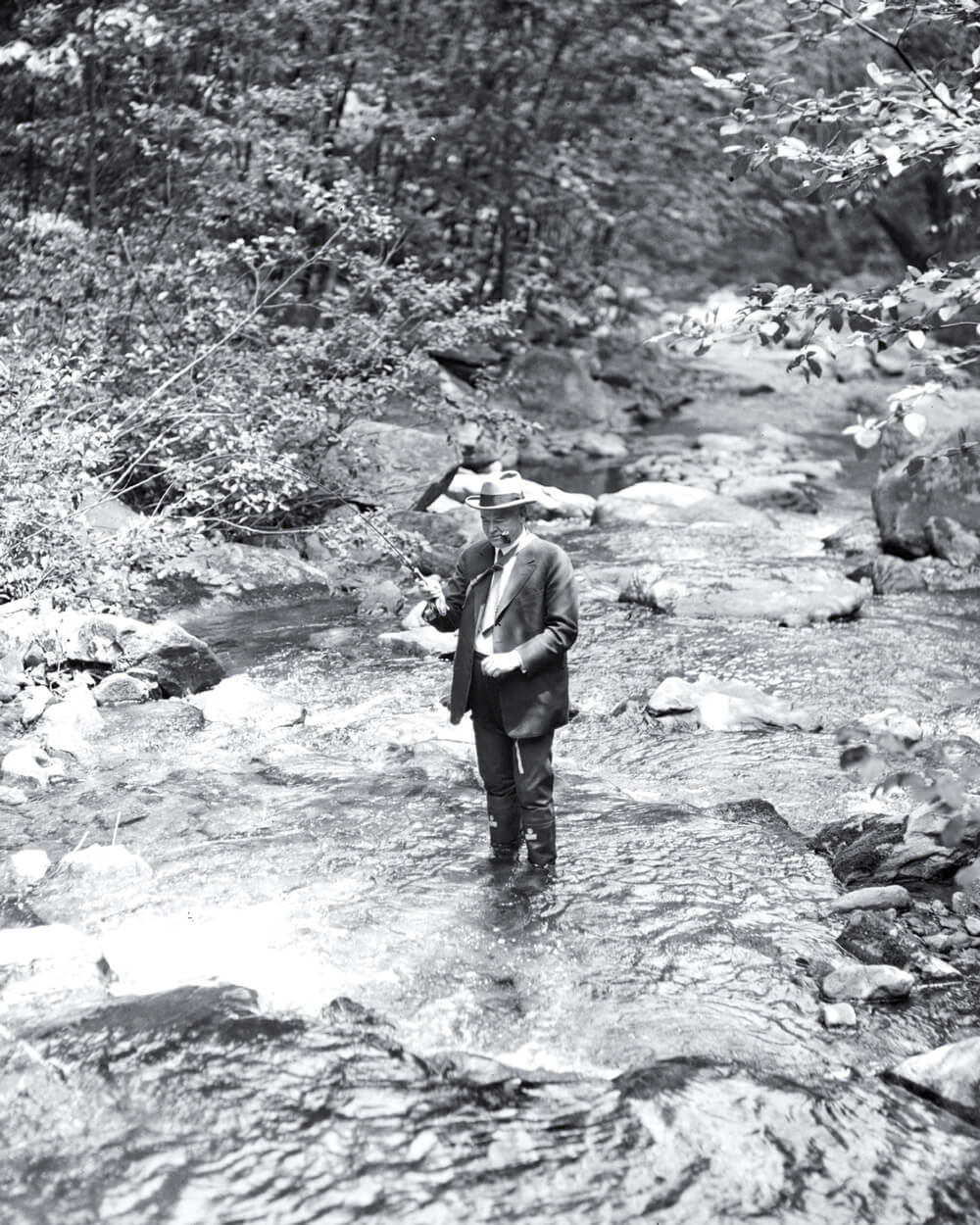
In 1927, Herbert Hoover, then secretary of commerce, gave a speech in Chicago at a meeting of the Izaak Walton League of America.[13] The arrogant young man who rode into Gwalia can still be made out, and yet there is at the same time a certain solicitude, a worry about preserving the harmony of nature. Fish are, in the end, ours for the taking, but we must still be careful not to take them all.
It may be that the difference of object—fish rather than metal—is in part responsible for the difference of temperament, but, whatever the reason, in contrast with the case of mining, Hoover is supremely skeptical of the presumption of progress in fishing. “Some millions of fishermen have invented thousands of new lures of seductive order,” he observes, “and devised many new and fearful incantations with a host of new kinds of clothes and labor-saving devices to carry them about.”[14]
This progress is in part a result of the global industry and trade that he himself has helped to drive: “We have arrived at the high state of a tackle, assembled from the steel of Damascus, the bamboos of Siam, the silk of Japan, the lacquer of China, the tin of Bangkok, the nickel of Canada, the feathers of Brazil, and the silver of Colorado—all compounded by mass production at Chicago, Ill., and Akron, Ohio.”[15] And yet all this progress has not advanced the art of fishing in the least: “But I ask you if, in the face of all this overwhelming efficiency and progress, there is less time between bites?”[16]
As in philosophy understood as the cultivation of a virtuous life, in fishing there can be individual progress that comes through long attunement to the nature of the creature one seeks; but there can be no historical progress through advances in the associated technology, the “tackle.” For the same reason, fishing also levels out class differences, as attunement to nature cannot be bought: “Nor do I need to repeat that fishing is not the rich man’s sport,” Hoover repeats, “though his incantations are more expensive. I have said elsewhere that all men are equal before fishes.”[17]
As had been the case for Walton, fishing is particularly conducive to the good of the soul, particularly in contrast with hunting, because its sought-after object is in truth only an occasion for the exercise of pleasurable attention to, and within, nature. To induce people to take joy in nature, they “need some stimulant from the hunt, the fish, or the climb.”[18] But for Hoover, the second of these options is not a stimulant like the others because it’s not excitative, but rather pacifying. And this is the reason for his love of it: “I am for fish. Fishing is not so much getting fish as it is a state of mind and a lure to the human soul into refreshment.”[19]
Hoover contrasts at some length the world of the 1650s with that of the 1920s. Walton, he says, “never got the jumps from traffic signals or the price of wheat.”[20] His spiritual predecessor could also have had no idea of pollution, “the poison cup which we give to eggs, fry, fingerlings, adolescents, and adult fish alike.”[21] If we want fish, he reasons with intentional obviousness, “we have to reserve for them some place to live.”[22]
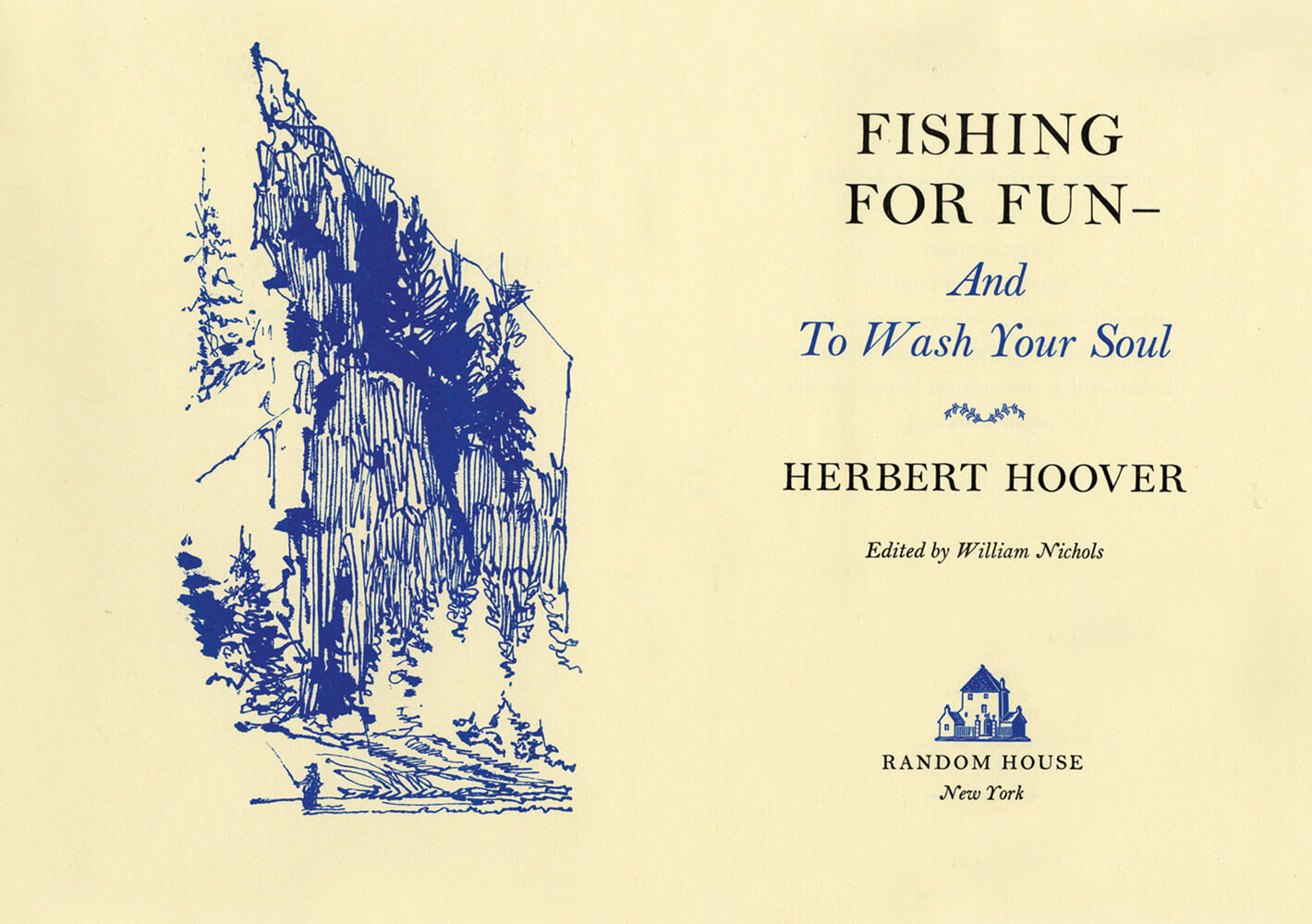
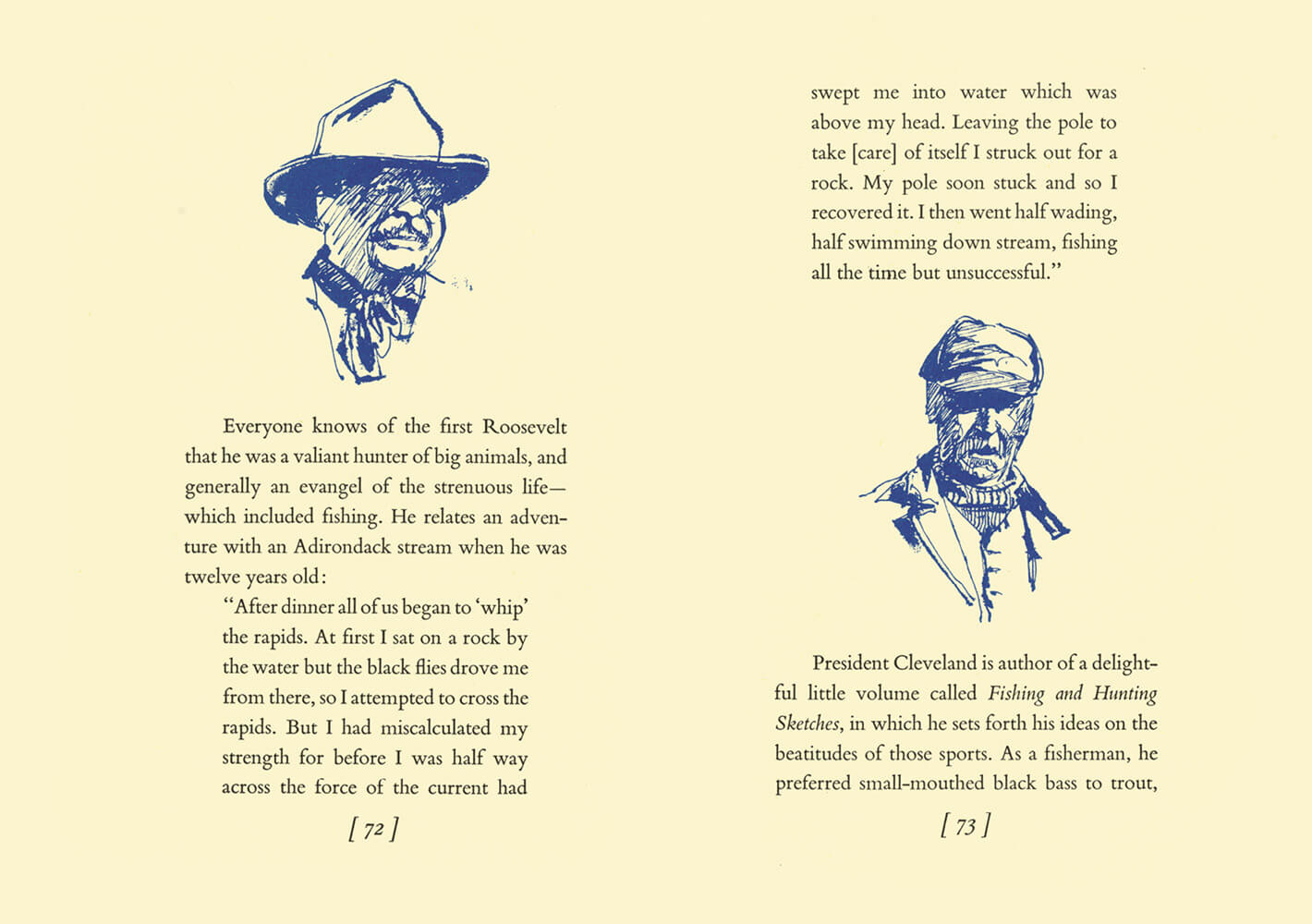
How do we do this? A sort of moderate conservationism would endure in Hoover’s thinking until the end of his long life. His final work, published in 1963, the year before his death, bears the anodyne title Fishing for Fun—And to Wash Your Soul.[23] He explains in the preface that a publisher had approached him concerning his many public addresses and magazine articles on fishing over the decades and suggested that “these meditations would make a little book of good cheer.” He found it hard to refuse: “In the daily grind of trying to find out why the Communists get that way, it would be an expedition into relief. So here they are.”[24]
Hoover now openly acknowledges that water pollution comes from “ships, factories, coal mines, chemical works in cities and towns—to mention only a few of them. Many of these things damage public health, destroy the outdoor appeal of the streams, and all of them damage the fish.”[25] And yet, “after all we are an industrial people. We have to work eight hours a day and all but a few weeks in the year, and we cannot abolish our industries and still pay for fishing tackle.”[26] Fishing inculcates virtues that mining never could, but no lesson learned from fishing could ever refute or overturn the philosophical disposition that Hoover had developed, inherited from Agricola and Bacon, in his labors as a mining engineer.
Extracting the tin of Bangkok and the nickel of Canada may not help fishing to advance, but if our extractive activities prove harmful to the fish and threaten the very activity of the fisherman, then it is not by retreat, but by further advancement of the first sort of philosophical project Hoover knew, the project of science, that we might hope to eliminate the harm. Philosophy as figuring things out and thereby coming to master and appropriate them must act as the faithful guardian of that humbler, purer, and vastly more ancient articulation of philosophy, as cultivation of a life of virtue, through, for example, “contemplation of the eternal flow of the stream, the stretch of forest and mountain,” which “all reduce our egotism, soothe our troubles, and shame our wickedness.”[27]
Philosophy as cultivation of virtue is thus contained within philosophy as what Foucault might call “power/knowledge.” National parks, first set up by Theodore Roosevelt at the encouragement of the wandering transcendentalist John Muir, are such worlds within a world. And old Herbert Hoover in retirement, down at the fishing hole—dreaming of his Iowa childhood, when spitting on the bait worm was the preferred incantation, and a hickory stick did as well as the finest store-bought pole; dreaming of that lost past, just as the Cold War was reaching its darkest hour, and the Americans and the Soviets who had “got that way” were targeting their intercontinental missiles—this too was a world within a world. But as we are reminded by “Gone Fishin’,” the song made famous in 1951 by Bing Crosby and Louis Armstrong, when someone engages in an activity conducive to happiness without having first put in their time, they are likely to invite reproach from those who have stayed behind under the reign of “responsibility.” In truth, the reproach to those who have not earned their right to “go fishin’” is this: You have escaped our world of power and disappeared into a world of happiness; how dare you.
Philosophy as the cultivation of virtue, I have said, has existed since antiquity alongside philosophy as inquiry into, and harnessing of, the forces of nature. Sometimes these two have been in harmony; sometimes they have not. Looking into the workings of nature—what goes on in the heavens above and in the earth below—has often been seen as a crucial component of the project of coming to understand our place in the cosmos, an understanding that is in turn necessary to avoid being disappointed by mortality, by unanticipated turns for the worse, by the fates. Thus, no true happiness without knowledge of the workings of nature. But pursuit of this knowledge was always a charged affair, and could easily cross over from virtue to vice, as wonder gave way to curiosity gave way to greed. Pliny drew the boundary at the surface of the earth: explore and come to know what comes out of the earth, but do not try to find where it comes from, let alone to extract it yourself. Bacon sought to scrap this limit and pushed for a new spirit of inquiry into nature in which no domain of it is best left alone by us, and no amount of intervention or exploitation pushes nature beyond what it, in itself, is suited for. This is the spirit that Hoover himself would inherit, one that sees knowledge as desirable principally to the extent that it aids in the accumulation of power, not in the cultivation of happiness.
And yet, as his late work shows, Hoover, like Walton, remained committed to happiness as the end of a certain kind of philosophical practice. He continues to embody two fundamentally different, and sometimes opposed, conceptions of philosophy: the one that takes it as a probing into nature, which after Bacon also becomes a violation of nature, and the other which takes it as the project of serenity, of ataraxia, of happiness. Of course, when Hoover is out fishing, he is not doing so in the same spirit as Bing or Satch. He is not shirking his responsibilities but rather basking in the certainty of having fulfilled them. In the manner of Cincinnatus, he acts the noble statesmen who, having made his contribution, then withdraws—not to the field, but to the pond.
He is also, perhaps, the last American president to embody, if mostly unconsciously, a connection to the two strands of philosophy we have identified, the one that accumulates knowledge as a means to power, and the other that cultivates virtue as equivalent to happiness. In him, they come together, while today, in the absence of any connection whatsoever between philosophy and the practice of politics, they appear opposed. Power tolerates happiness, until it gets in the way; and happiness ignores power, as long as it can. And American presidents come and go, each generally more violent than the last, and each generally more forgetful than the last of what “virtue” had once meant.
- Herbert Clark Hoover and Lou Henry Hoover, “Translators’ Preface,” in Georgius Agricola, De re metallica, Translated from the First Latin Edition of 1556, with Biographical Introduction, Annotations and Appendices upon the Development of Mining Methods, Metallurgical Processes, Geology, Mineralogy & Mining Law from the Earliest Times to the 16th Century, trans. Herbert Clark Hoover and Lou Henry Hoover (London: The Mining Magazine, 1912), p. i.
- John Evelyn, Fumifugium; Or, The Inconveniencie of the Aer and Smoak of London Dissipated (London: Godbid, Bedel, & Collins), 1772, p. 41ff.
- Georgius Agricola, De re metallica, p. 3.
- One group that modified Hegel to make him suitable for the United States were the St. Louis Hegelians. For more on the group, see John Kaag, “America’s Hands-On Hegelian,” in Chronicle of Higher Education, vol. 62, no. 28 (25 March 2016), and Matt Erlin, “Absolute Speculation: The St. Louis Hegelians and the Question of American National Identity,” in German Culture in Nineteenth-Century America: Reception, Adaptation, Transformation, ed. Lynn Tatlock and Matt Erlin (Rochester, NY: Camden House, 2005).
- Pliny the Elder, Natural History, Book XXXIII, ch. 1.1, “Metals.” The translation I am using here is from The Natural History of Pliny, vol. 6, ed. and trans. John Bostock and H. T. Riley (London: Henry G. Bohn, 1857), p. 69.
- As the translators note, vena is among the mining terms that Agricola inherits from Latin antiquity, though much of his vocabulary is also an attempt to render in Latin what had previously only been treated in writing in Ulrich Rülein von Calw’s Nutzlich Bergbüchlein, (Useful little book of mining), published in Erfurt in 1527. A crucial distinction for Agricola is that between venae profundae and venae dilatatae, which had been earlier rendered in German as, respectively, Gänge and schwebende Gänge, or, in the equivalent terms the Hoovers identify in contemporary geology, “fissure veins” and “bedded deposits.” See Georgius Agricola, De re metallica, p. 43, footnote 1.
- Ibid., p. 5.
- Ibid., p. 6.
- Athanasius Kircher, Mundus subterraneus, quo universae denique naturae divitiae (Amsterdam: Joannem Janssonium and Elizeum Weyerstraten, 1665).
- Izaak Walton and Charles Cotton, The Compleat Angler; or, The Contemplative Man’s Recreation. Being a Discourse of Fish and Fishing, Not Unworthy of the Perusal of Most Anglers (London: Thomas Nelson and Sons, 1900), pp. 153–154. The word ‘reins’ here indicates the kidneys. Walton continued to add to the book in subsequent editions; for the fifth edition, which was published in 1676, Cotton provided a second part. Walton is the sole author of all passages cited here.
- Ibid., p. 206.
- Ibid.
- Herbert Hoover, A Remedy for Disappearing Game Fishes: An Address by Herbert Hoover, Secretary of Commerce, Delivered Before the Izaak Walton League of America (Washington, DC: US Government Printing Office, 1927). The speech was delivered on 9 April 1927.
- Ibid., p. 2.
- Ibid.
- Ibid.
- Ibid.
- Ibid., p. 12.
- Ibid.
- Ibid., p. 2.
- Ibid., p. 9.
- Ibid.
- Herbert Hoover, Fishing for Fun—And to Wash Your Soul (New York: Random House, 1963). Hoover had described fishing as a “wash of the soul” already in his 1927 speech, and attributed this expression to the poet Edgar Guest. To impart some idea of the poet’s stature, it is enough to cite a couplet by Dorothy Parker, referring to a certain examination for diagnosing syphilis: “I’d rather flunk my Wassermann test / Than read a poem by Edgar Guest.”
- Ibid., unpaginated preface.
- Ibid., p. 51.
- Ibid.
- Herbert Hoover, A Remedy for Disappearing Game Fishes, p. 12.
Justin E. H. Smith writes from Paris. He is the author, most recently, of The Philosopher: A History in Six Types (Princeton University Press, 2016).
Spotted an error? Email us at corrections at cabinetmagazine dot org.
If you’ve enjoyed the free articles that we offer on our site, please consider subscribing to our nonprofit magazine. You get twelve online issues and unlimited access to all our archives.